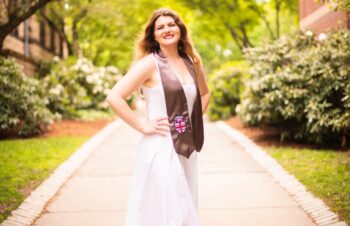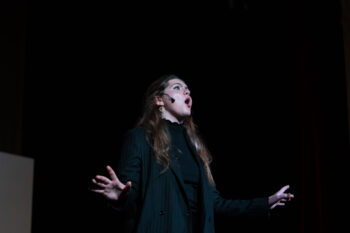Kaetlyn Liddy

PCM: What did you study at PCM and who were your teachers?
KL: I studied Classical Voice under Mariné Ter-Kazaryan from 2011-2017. I also took virtual lessons from Mariné during the pandemic from 2020-2021.
PCM: What is the most valuable thing you have learned from studying music and/or our instructors? Do you have a particular memory from your time here that stands out to you?
KL: The most important thing I learned from studying at PCM was how to sing with proper technique, not just to improve the quality of my singing, but to ensure longevity. More than anything, I’d like to be able to sing for my entire life. Studying classical voice and honing my technique was essential for me to prevent vocal damage. I sang and performed a lot in college and without this foundation, I’m not sure I would have had the stamina to do this without risking damage to my voice.
PCM: What’s it like for you to sing musical theater versus classical repertoire?
KL: Before I started taking classical lessons with Mariné, I didn’t understand how inextricably linked the two styles are. I viewed myself as a musical theater singer and had no idea how transferrable classical technique is to all genres of singing. Through studying classical repertoire, I’m able to foster the same healthy, full production of sound to my musical theater singing. Along the way, I gained such a passion and appreciation for singing arias and other classical repertoire independently of musical theater. Now, I don’t view them as being so distinct. I try to employ the same technique in both styles and there are many musical theater pieces that require you to apply “classical” technique and style.

PCM: What are some recent theatrical productions you’ve been in? Any highlights?
KL: At Brown, I performed in dozens of musicals, plays, and concerts. Some of my favorite roles were Mother in Ragtime, Bobby in Company, and Velma in Chicago. I am also a graduate of Brown’s Applied Music Program, where I studied Classical Voice in a mini-conservatory setting. I had the opportunity to take private lessons, perform in master classes, juries, and create and perform my own Senior Recital, where I showcased my classical and musical theater repertoire over the years. Now, I live in New York City and work as a journalist for NBC News. I intend to pursue performing professionally, but am grateful that the industry has become more flexible in the past few years so that I can simultaneously audition and have a career I’m passionate about.
PCM: During the pandemic, you took virtual lessons with your high school voice teacher, Mariné Ter-Kazaryan. What was that experience like for you?
KL: The pandemic, while an obviously difficult time for artists, was also a great opportunity to return to technique. Shows and other performance opportunities weren’t an option, so I decided to reach out to Mariné when I left my college campus in March 2020. My younger brother, Ryan, has been studying under her since I left for college and every summer, I’d return to PCM and take lessons too. I was initially skeptical of virtual lessons because I knew how dynamic in-person lessons are. I couldn’t imagine voice lessons without seeing Mariné in-person, offering hands-on adjustments and live piano accompaniment. Virtual lessons actually turned out to be enormously helpful and I think I progressed more in that online year than in any other before. I think this was partially due to being able to see myself on-camera and actually see and fix certain bad habits. I also think that the rest and recuperation that time off from performing was a key element in my progress. I got to learn several new arias and fine-tune others that I wasn’t quite ready for at 18, when I was a senior in high school. Most of all, it was so important to me to take lessons and keep music in my life when every other artistic thing in my life fell away so suddenly. I felt so lucky to have the technology to continue progressing while the world ground to a halt.
PCM: Is there anything else you would like to share with the PCM community?
KL: PCM was so integral to my development as an artist and person and I encourage all PCM students and alumni to keep in touch with your teachers. Even if you aren’t pursuing music professionally, your journey as an artist doesn’t have to end when you graduate high school or college. Studying voice has brought me so much joy and it is absolutely possible to consider learning and growing as an adult.



